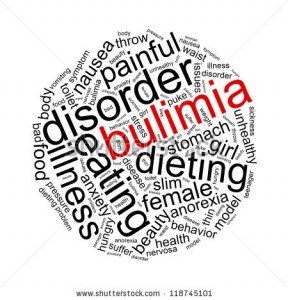 Bulimia Nervosa
Bulimia Nervosa
Struggling with symptoms of bulimia is extremely harmful to a person’s physical and mental health. Those who suffer often do not ‘appear’ to have an issue with food and thus do not believe they deserve support or treatment. Unfortunately, this results in years of silent suffering until they finally cannot take being on this emotional roller coaster any longer. Often, bulimia begins with a desire to lose weight and thus will begin to diet. The restriction of meals while dieting (usually taking place during the day) will lead to binge-like behaviors in the evening. Guilt and critical thoughts citing low willpower ensues due to falling off the ‘diet bandwagon’, and the torturous cycle of restriction begins all over again the next day.
According to the DSM-5 criteria, to be diagnosed as having Bulimia Nervosa a person must display:
- Recurrent episodes of binge eating. An episode of binge eating is characterized by both of the following:
- Eating, in a discrete period of time (e.g. within any 2-hour period), an amount of food that is definitely larger than most people would eat during a similar period of time and under similar circumstances.
- A sense of lack of control over eating during the episode (e.g. a feeling that one cannot stop eating or control what or how much one is eating).
- Recurrent inappropriate compensatory behavior in order to prevent weight gain, such as self-induced vomiting, misuse of laxatives, diuretics, or other medications, fasting, or excessive exercise.
- The binge eating and inappropriate compensatory behaviors both occur, on average, at least once a week for three months.
- Self-evaluation is unduly influenced by body shape and weight.
- The disturbance does not occur exclusively during episodes of Anorexia Nervosa.
Warning Signs
- Evidence of binge eating, including disappearance of large amounts of food in short periods of time or finding wrappers and containers indicating the consumption of large amounts of food.
- Evidence of purging behaviors, including frequent trips to the bathroom after meals, signs and/or smells of vomiting, presence of wrappers or packages of laxatives or diuretics.
- Excessive, rigid exercise regimen–despite weather, fatigue, illness, or injury, the compulsive need to “burn off” calories taken in.
- Unusual swelling of the cheeks or jaw area.
- Calluses on the back of the hands and knuckles from self-induced vomiting.
- Discoloration or staining of the teeth.
- Creation of lifestyle schedules or rituals to make time for binge-and-purge sessions.
- Withdrawal from usual friends and activities.
- In general, behaviors and attitudes indicating that weight loss, dieting, and control of food are becoming primary concerns.
- Continued exercise despite injury; overuse injuries.
Medical Complications
- Acid Reflux
- Dehydration
- Dental problems
- Digestive difficulties
- Dry skin, hair, and nails and hair loss
- Edema (Swelling of soft tissues resulting from excess water accumulation from laxative or diuretic abuse)
- Electrolyte Imbalances
- Gastrointestinal complaints (cramps, bloating, constipation, diarrhea, incontinence)
- Hypo- and Hyperglycemia (low/high blood sugar)
- Hyponatremia (low sodium)
- Infertility
- Kidney infection and failure
- Liver failure
- Low blood pressure or hypotension
- Low body temperature
- Low platelet count
- Malnutrition
- Muscle Atrophy
- Pancreatitis
- Parotid gland swelling
- Seizures
- Sleep problems
- Tearing of esophagus
- Weakness and fatigue
Often, but not always, individuals with eating disorders have other symptoms and problem that are not part of the diagnostic criteria for their eating disorder. It isn’t uncommon to see in bulimia symptoms such as:
- Self-cutting
- Self-harming behaviors
- Body Dysmorphic Disorder
- Personality disorders
- OCD (Obsessive Compulsive Disorder)
- Substance abuse disorders
Treatment
No single approach to eating disorder treatment will work equally for everyone. The right method of treatment depends on an individual’s strengths, goals and the nature of their eating disorder. If you or someone you know is suffering from bulimia, binge eating, or exercise addiction, the first step is to talk about the problem and seek the guidance of an eating disorder therapist and medical professional as soon as possible.
While researching possible treatments, keep the following in mind:
- Treatment often involves a combination of psychotherapy, nutritional counseling, medical and psychiatric management.
- Treatment can take place in an outpatient, partial or day treatment program or 24-hour setting, i.e. residential or hospital setting.
- Treatment can be enhanced by the involvement and participation of family/friends.
- Treatment can be enhanced with the use of recovered professionals or mentors.
- Treatment may require hospitalization, depending upon the severity of the problem.
With any treatment plan it is important to explore the behavioral symptoms and any underlying issues that may have caused or serve to perpetuate the eating disorder. Research supports that individuals with eating disorders can become fully recovered.
